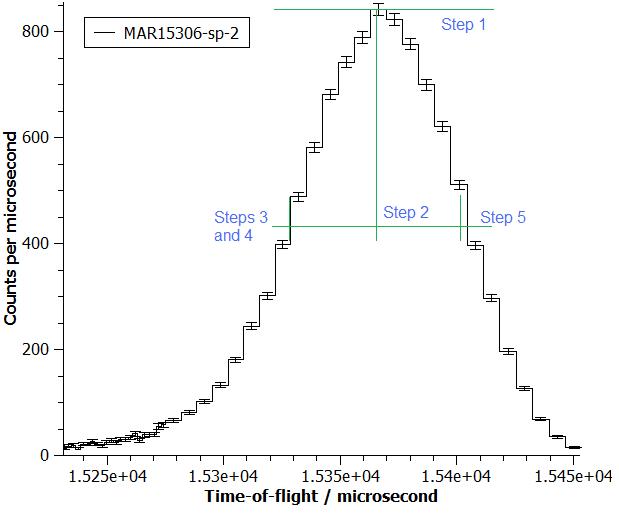Table of Contents
Calculates the kinetic energy of neutrons leaving the source based on the time it takes for them to travel between two monitors.
| Name | Direction | Type | Default | Description |
|---|---|---|---|---|
| InputWorkspace | Input | MatrixWorkspace | Mandatory | The X units of this workspace must be time of flight with times in micro-seconds |
| Monitor1Spec | Input | number | Mandatory | The spectrum number of the output of the first monitor, e.g. MAPS 41474, MARI 2, MERLIN 69634 |
| Monitor2Spec | Input | number | Mandatory | The spectrum number of the output of the second monitor e.g. MAPS 41475, MARI 3, MERLIN 69638 |
| EnergyEstimate | Input | number | Mandatory | An approximate value for the typical incident energy, energy of neutrons leaving the source (meV) |
| IncidentEnergy | Output | number | ||
| FirstMonitorPeak | Output | number |
Uses  to calculate the energy of neutrons leaving the
source. The velocity is calculated from the time it takes for the
neutron pulse to travel between the two monitors whose spectra were
specified.
to calculate the energy of neutrons leaving the
source. The velocity is calculated from the time it takes for the
neutron pulse to travel between the two monitors whose spectra were
specified.
An initial energy guess is required for the algorithm to find the correct peak. The analysis will be done on the highest peak that is within 8% of the estimated TOF given by the estimate.
Not all neutrons arrive at the monitors at the same time because their kinetic energies, and therefore velocities, are all different. The time of arrival of the neutron pulse is taken to be the mean of the two half peak height locations. The half height points are found as follows:
The above process is illustrated on a peak is shown below in the image below

The distances between the monitors are read from the instrument definition file. It is assumed that the source and the monitors all lie on one line and that the monitors have the same delay time.
Warning
This version is an older algorithm and is no longer in current use, although it is not deprecated.
Categories: Algorithms | Inelastic\Ei